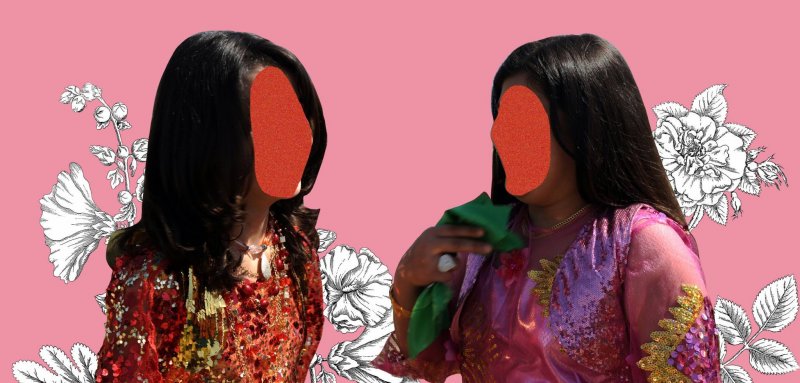I do not remember the exact year. At the end of the 1990s, I was in the seventh grade at the Zaki Arsouzi School for Girls in the predominantly Kurdish city of Qamishli in the north of Syria. The school uniform at that time was called the `’thug” suit, a uniform that was more like a military uniform than a civilian one.
I recall the exact day. It was March 22, the day after the feast of Nowruz. We all lined up to salute the flag and chant the slogans: "Our leader forever ... Hafez al-Assad". "Our goals ... unity, freedom, socialism".
The school coach who was a complete bully, cut short the slogan chanting, which was unusual, because he enjoyed prolonging it and savoring our torture for as long as possible. He used to particularly enjoy getting creative with slogans and nationalistic lectures on rainy days or scorching hot sunny days.
As soon as we finished saluting the flag, he turned to us and said, "Every brat that didn’t come yesterday go stand there, only 40 students from the whole school came!”
Within seconds, the majority of students moved to the opposite side and the investigation began as if we were in a police station. "Why didn’t you come yesterday?" "I was sick comrade.” "I had a stomach ache comrade.” Dozens of us were interrogated. After each question, the student was beaten with a cane on the palm of her hand, told off and threatened with punishment and suffering. Then my turn came.
“Finda why didn’t you come yesterday? Were you also sick?” "No comrade I wasn’t sick.” He stood shocked and did not move to the next victim. He looked at me threateningly. "Then why didn’t you come?" And I answered him: "Comrade you know why we didn’t come. Why do you want us to lie to you?”
His frown deepened. "No I dont know!" he said.
“Comrade we were all celebrating Nowruz."
I felt a stinging sensation on my left arm as though a heated rod had touched it. The impact of the word Nowruz was more severe than asking me to open my hand to hit it. My friend intervened out of fear for me and said: "Comrade we went on a trip."
"We were all celebrating Nowruz and you knew that."
I angrily gestured to her not to interfere as I was beginning to enjoy provoking. My frankness gave me a sense of freedom I did not want to give up.
"We were all celebrating Nowruz and you knew that."
Another blow came ringing down on my arm. There were titters among the students and the voices rose. The coach feared that our fear would disappear and the name Nowruz would be repeated. He sent me to the principal, separating me from my friends. He continued to practice his sadism on the other students with all available means of torture and humiliation.
After this incident I stayed at home for several days as a punishment and then moved to another school.
Nowruz became an official holiday called "Mother's Day" and the Assad regime followed a more "diplomatic" way of dealing with the celebrations of Nowruz and this incident became forgotten ... until the revolution broke out.
Syrian media called a demonstration in one of the squares a prayer for rain. They called revolutionaries infiltrators. Everyone was upset, but I felt fear rather than anger. I realized that the years had changed only the surface appearance of the regime. Our Nowruz was called "subversion", and interrogators will torture detainees in prison when the words demonstration or freedom speech is mentioned just as that vicious coach did so many years ago.
Our Nowruz was not very different from the roses of Ghiyath Matar, who offered them along with water to regime soldiers during demonstrations in the city of Daraya, and was later murdered in detention. We all wanted that freedom. We both wanted to prove to ourselves first and then to the world that we are here and that we are not evil as they claim.
How many houses do singing and dancing destroy? And how many souls have roses extinguished?
Ghiyath was killed in the same way they tried to kill our Nowruz.
I apologize for repeating the word Nowruz in the article ... but that’s what deprivation does, my friends.
Raseef22 is a not for profit entity. Our focus is on quality journalism. Every contribution to the NasRaseef membership goes directly towards journalism production. We stand independent, not accepting corporate sponsorships, sponsored content or political funding.
Support our mission to keep Raseef22 available to all readers by clicking here!
Interested in writing with us? Check our pitch process here!



